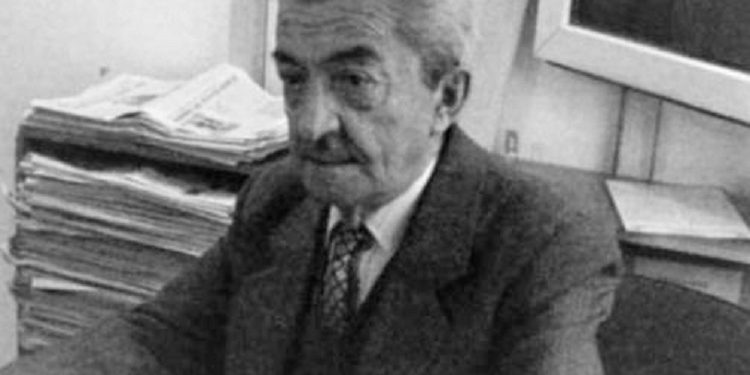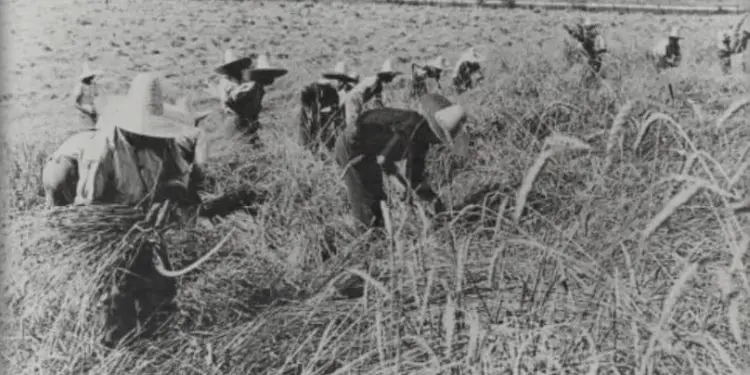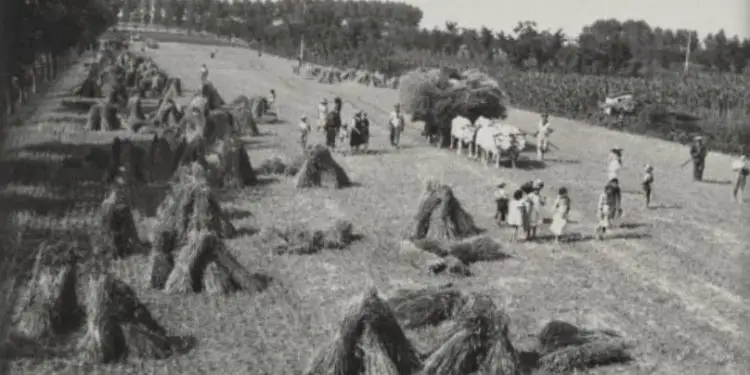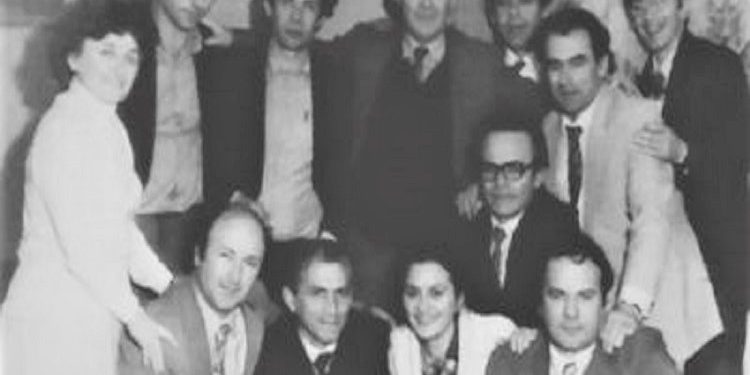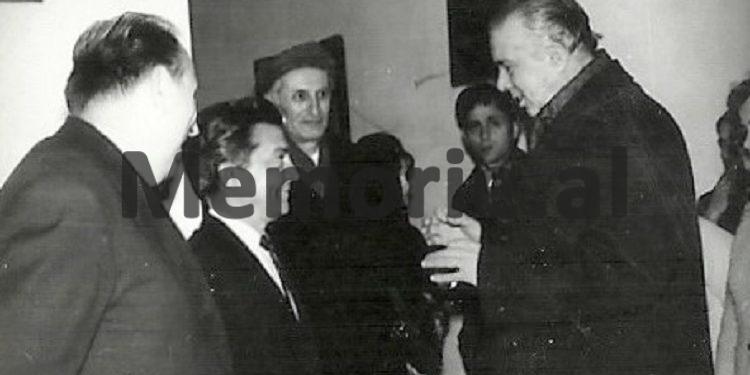By Vangjush Gambeta
Part four
– The rare testimony of the well-known former journalist of the “Zëri i Populli” newspaper, who was interned in the villages of Mat district in 1975, where he worked in agriculture, until the collapse of the communist regime-
Memorie.al / I left the office and headed to the dental clinic, next to the Journalists’ Club. Since I was leaving to go to the meeting, I told my friend to wait for me right there, not at the Journalists’ Club, where we often left the meeting. -No! Not in the Club of Journalists! -Why? – From the first meeting, everyone avoids meeting me in places where there are other people. Nobody likes witnesses. They are right, they hurt themselves and me: “Why did you meet him?”, “What did you say to him?”, “What did he say to you?” The vigilance mechanism starts to work to “detect” the enemies…!
Continues from last issue
– “The war reaped the brave, while after the liberation the dictatorship put the rabbit in people’s stomachs”!-
The chief agronomist was silent and was looking at the fried stove pipe, without moving his head, with his palms extended from the stove. With this attitude, he wanted to say that there was nothing else to talk about and that he didn’t want anyone else to come and find us talking. I got up and just said: “Thank you”! He sent me off with the words:
-Do not worry. Maybe, it’s just a rumor. I believe that you know that I have not discussed anything with you…!
When I shook his hand to leave, I saw on the face of the chief agronomist the pity of a good man who wants to, but cannot help you.
I came out relieved, because the fear that caused me to shiver, that something had happened to the boy in Tirana, was gone. In Xibër, or in Martanesh, this did not matter at all. Even there they will give me a tub and tell me to clean the thorns, to bleed my hands, pulling out their roots.
Ferrats are the same, as everywhere in Albania. And everywhere in Albania there are good people. Other work than the “enemy”, it is difficult to communicate with them.
New Year 1975 was approaching. I locked myself in my room and tried to analyze the events of the last few months. I remembered the conversation with Hoxha.
A few days ago, when I went out to go to the grocery store, to eat that six-ALL bean baguette (it was not difficult to count the beans), with a five-ALL corn bread, I found the grocery store closed. The post office clerk, who happened to be there in front of the canteen, told me that the cook had not come today, so I had to go and buy the bread myself at the bakery.
– Where is the oven?
– Here, – he explained to me politely, showing me with his hand the direction from which I had to walk, – this road leads straight to the oven. It’s not far, a quarter of an hour.
The road was a goat path, but quite beaten by passers-by. Vaita. I bought the bread. On the way back, halfway, I heard a voice from behind:
– Stop, my friend!
I turned my head and… surprise! What is this? A vision? A daydream? I never thought that I would see here, in this country that for the level of poverty reminded me of the television column “Places and Peoples”, such a graceful human being, a small man, dressed in a black suit and white shirt, with a beard “ala Bulganin” and glasses with metal frames. He approached me and held out his hand.
– Good luck, my friend!
– Good luck, – and after a pause, – excuse me, but who am I meeting? – I asked him to get ahead of any unexpected, so that I would know how to talk to this unusual man for these parts.
– I am a resident here. I was the lord of these villages.
– Ah, you were… the storekeeper of Qafuku told me about you.
We looked into each other’s eyes and smiled at each other.
We started to do the other half of the way to Vanar together. But this piece of road lasted more than a quarter of an hour, because, wanting not to interrupt the conversation, we were forced to stop in places, to get ahead of each other, when the path became narrower, sometimes passing to the left and sometimes to the right, in order to bypass a ferret.
– How are you doing here? – Hoxha asked me.
-Good.
After a few steps:
– I asked you how you are spending your time here, – Hoxha repeated.
-And I answered: good!
After a few steps:
– I asked you in vain, because I knew that this is how you would answer me.
I remembered the storekeeper of Qafuku, who had told me that Hoxha had studied in Istanbul. To please him, I said:
– The Turk did not say “sabr – salamet” for nothing.
– Ah, yes! – Hoxha said excitedly. – In Albanian we say “I forbearing – i won”, but that’s not enough, my son! All through life, with patience, a man may struggle before he succeeds. Therefore, oblivion is also necessary. Forget who you were and how you lived and you will calm down, you will face difficulties more easily, until the day comes when you succeed.
I didn’t quite understand what you meant by giving me this advice. Maybe he just wanted to calm me down. What answer should I give? But I got out of this trouble because we arrived in front of the offices. Some Chunas were sitting there and talking. Hoxha interrupted the conversation. We parted with a “Cheers!” and hodja entered the post office. One of those chunatas approached me and said:
-How do you know Hoxha?
-No I do not know. I was in the bakery for this, – and I showed him the piece of bread, – on the way back, we met to make a piece of the road together.
What was this nipper? Just a curious, or some vigilant son? But one of his slightly older friends grabbed him by the arm and pushing him away from me shouted: “What’s wrong with him? Leave it alone!”.
I began to analyze the conversation with Hoxha. I had no choice but to endure. But to endure, facing every difficulty, you have to be brave. The coward can’t stand it. Out of fear, he gets disoriented and gets angry quickly. So I had to become braver. But what is bravery? It is the question that has often arisen in my life and that I have tried to explain to myself.
Myslim Keta gave me a beautiful answer. It was January 1961. Newly married, I was thinking about where to spend a couple of weeks off with my wife. A friend told me: “Ask for a camping ticket to the Officers’ Rest House, on the Durrës beach. They will surely give it, because there are not many vacationers in this period”.
And indeed, the only “vacationers” there were a small group of officers of a military unit stationed in Durrës. Their commander was the brave Muslim Keta, whom I had the good fortune to meet. We often had lunch together at a table. Despite all the efforts I made to “harvest” some of his feats during the National Liberation War, I did not succeed.
It is known that the real brave never talk about their bravery. Then I thought I’d switch to a general topic. And I asked him: “What is courage”? Muslimi was silent for a few minutes, thinking. Persistent, like any journalist, I repeated the question. And he said to me:
– Courage is not having a weapon and emptying it against someone who has no weapon. This is meanness.
After a short pause:
– Courage is not digging a well and killing a man who is walking on the road and who does not know in what hell you are hiding. This is infidelity.
Again a pause.
– Bravery is not proven even in a duel. Chance often plays a role here, not to mention fate.
Another pause.
-I found it! Courage is the coolness in difficult situations. Are you cramped? You were keeping your cool and thinking about how you will get out of the difficult situation, you are brave. If you lose your temper, grab your gun, scream, shout, threaten, you are a coward, unless you are crazy.
– Is the brave afraid? – I continued to tease the conversation.
– Only a fool is not afraid. Even the enemy’s bullet kills, it takes your life. But fear is overcome with coolness…!
I remembered this conversation when we were filling sacks with wheat together with a charming old man from Keta. It was the wheat planting campaign. From the brigades came the gnats that took the seed. To prevent the peasants from eating the seed, instead of planting it, the wheat had to be poisoned.
I was assigned to deal with this work. In front of the warehouse, a plastic was opened; a sack of wheat was poured into it. I had to add a shovel of poison-dust, mix it well with the wheat.
This work was easier than pulling out thorns, but more harmful to health. The storekeeper had found out that no one would accept to do this job. Then a wise man came out and found the solution: “Call that internee, if he keeps it, let him refuse”! Of course, it didn’t “keep me” and I started working.
One day I was supplying the charming old man from Keta with a quintal of seed. After mixing it, I was waiting, shovel in hand, for the old man to open the mouth of the bag and I would fill it with the shovel.
– No, not with a shovel, – said the villager. Then he sat down, put one side of the sack under the wheat and began to push the wheat into the sack with his hand. He told me to do the same on the other side.
– It is poisoned, – I told him.
– I ate it and it didn’t find anything. I washed it two or three times and made bread. This is very good wheat for bread. They ate it dry. Hi! HI! – The old man laughed with all his heart. – When you finish work, wash your hands well before eating bread.
When we were filling the second sack, the old man said to me:
-Don’t tell the man about the poisoned wheat bread job.
– Don’t be afraid, – my mouth opened.
– Afraid? I know who you are, so I don’t have to be afraid. Hi! Hi! – he laughed again.
After I helped him to load the mule the old man said to me:
– I know you are suffering. We are all suffering.
Maybe he had heard that in those days I used to fill the milk jug with whey to eat bread. Before he left, seeing my dead face, he looked me straight in the eye and with an expression on his face that read pity, he said to me:
-Do you know, my son, what bravery is? Courage is that even when you run out of bread, you don’t get upset. Don’t be upset! Hi! Hi! – He grabbed the mule by the saddle and set off on the road. To plant or to make bread, so that the people can eat it dries?
* * *
New Year approached. 31 December. In Vanar, the duty of the armament depot, the postal clerk and I remained. The warehouse clerk told me:
– I’m on the third shift. After a while, if you want, come to me and we’ll be together. I don’t think anyone will come tonight.
But I was so upset that even the stove with the roaring fire that roasted the lambs could not warm me. I took a book out of my suitcase to read and pass out, but I couldn’t read. My eyes filled with tears. What are Violeta and Artan doing tonight at the New Year’s table?
I myself had a piece of bread and cheese. Food does not bring joy at New Year’s dinner. But the family joy at this dinner requires that the table be full of food, that there is also a glass of brandy and a glass of wine.
It’s amazing how messed up life is. I usually accompanied the brandy with onions and carrots. When I thought about this, the strong stench of onion and garlic pierced my nose. My room had been a warehouse six months ago, where the cooperative kept onions and garlic. The unplastered walls had absorbed their smell so strongly that it was still felt six months later.
“So I have the appetizer”, I said laughing to myself, “I only need one glass”. I was interrupted by someone knocking on the door. I was terrified. When I had been on leave for three days in Tirana, a friend, who met me by chance at the entrance of the hotel, told me:
– Have you been outside? Here the word has been opened as if they have arrested you!
I had heard more than one case of people arresting them on New Year’s Eve and killing them without trial. But these, as they told me, had happened in the first years after the war, I was not afraid of the arrest, because during these six months, I was convinced that it was better to be in prison, than exiled, lonely like me. But what happened after that with the wife and son?
The knock on the door was repeated, louder this time. “It must be open”, I thought, “Otherwise they will break it”. While the word was out in Tirana that I had been arrested, I thought that my name would have entered some list of arrests. And I anxiously awaited the arrest.
I went and opened it. In the dim light of the room, at 12 o’clock, on the border between 1975 and 1976, I saw the silhouette of the postman, who left something wrapped in newspaper in my hands.
-Tonight we have the New Year, – he told me. – I brought you something from home. I’m sorry, I can’t stay. I can’t leave the mail alone. – And left.
I opened the newspaper. It was the New Year’s gift, the most expensive gift, with a great human value for the state of mind I was in: it was a big piece of roast meat and a good piece of pie…”! Memorie.al




